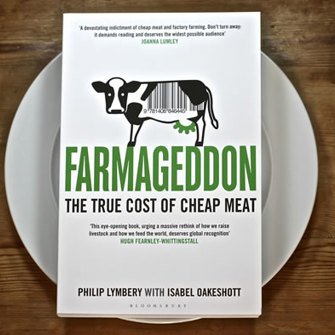Published 06/02/2014

FARMAGEDDON, a book written by Compassion’s CEO Philip Lymbery with Sunday Times political journalist Isabel Oakeshott, is out now!
The book, published by Bloomsbury, talks about the impacts industrial farming is having on the future of our food, the environment and our health.
Philip says: “In an attempt to feed the world we are in danger of sleepwalking into Farmageddon. Another wave of industrialisation is looming and would bring with it a deeply diminished countryside, surging disease, unhealthy food, and growing world hunger.
“Through Farmageddon, I’m exposing the true cost of cheap meat and calling for urgent action to save the countryside and ensure a future based on decent, nutritious food for all.”
Those pushing for further intensification often justify it on the grounds that we need it to provide food for the poor and to feed a growing population. Farmageddon debunks these myths.
Around two-thirds of farm animals worldwide are often fed human-edible grain, but farm animals are inefficient converters of energy. On average, 100 calories of animal feed will produce only 30 calories of meat and dairy products. There is more than enough food to feed the world; the problem lies entirely in its illogical distribution.
The book begs the question: is it right to expect people on lower incomes to feed unhealthy food to their children? It asks: do we want a decimated countryside devoid of birds, bees, butterflies and other wildlife? It questions whether industrial farming is the right way to feed the world.
The food system is broken but we can fix it. If people ate less meat, there would be less pressure on farmers to rear livestock intensively and crops could then be used to feed people.
The solution to the challenge of feeding more than 9 billion people is not simply to intensify food production. Instead, it’s about improving our diets by eating less meat and choosing food from higher welfare systems, so that we can all reduce waste, improve animal welfare and maintain a healthy food system for the future.
Food companies need to manage their supply chains more effectively to ensure the traceability and transparency of the food they sell through robust distribution channels, where more animals are reared on farms with better welfare standards.
Philip adds: “Everyone can be part of the solution. Governments can help improve the health of their nation and safeguard future food supplies by supporting food production that puts animals back on the land instead of in factories.
“Consumers can make a difference by buying products from higher welfare production systems.”
The book has already garnered praise from high-profile names and the media.
Hugh Fearnley-Whittingstall says: “This eye-opening book – urging a massive rethink of how we raise livestock and how we feed the world – deserves global recognition.”
Joanna Lumley says Farmageddon is: “A devastating indictment of cheap meat and factory farming. It demands reading and deserves the widest possible audience.”
The book has also received favourable coverage in the media, with articles in the Sunday Times, Daily Mail, Observer and the Guardian, among others.
You can buy a copy on Amazon or other good online bookshops, for example Book Depository or Waterstones.